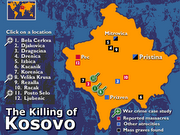Russia rejects U.N. resolution on Kosovo
By EDITH M. LEDERER, Associated Press WriterThu May 31, 7:50 PM ET
The United States and European nations introduced a revised U.N. resolution Thursday supporting independence for Kosovo under international supervision, but it was immediately rejected by Russia — who hinted it would veto the measure.
The new draft included several minor changes that sought to address Russia's concerns about ensuring that Kosovo's multiethnic character is preserved. But it did not include Russia's main proposal for new negotiations between the province's majority ethnic Albanians, who are demanding independence, and its minority Serbs, who want to remain part of Serbia.
"The introduction of this updated version of the draft has not changed anything as far as we are concerned," Russia's U.N. Ambassador Vitaly Churkin said. "We should think in terms of continued effort to find a mutually acceptable solution to the future of Kosovo."
He cited an "important letter" from Serbia's Foreign Minister Vuk Jeremic to U.N. Secretary-General Ban Ki-moon asking the U.N. chief to set up new negotiations on Kosovo's status. Jeremic said the main objective is "to reach a compromise solution" to guarantee Kosovo's long-term stability — but he also reiterated Serbia's opposition to Kosovo's independence.
The resolution's supporters said they want swift action on the resolution, which would end U.N. administration of Kosovo in 120 days and have the European Union take over the province's supervised transition to independence. NATO-led troops would remain to help ensure security and an international civilian representative would oversee the transition.
U.S. Ambassador Zalmay Khalilzad, the current Security Council president, said council experts would meet Friday to discuss the new draft. Churkin said he might send a representative to listen, but said Russia would not discuss a draft that did not address its concerns.
Khalilzad said the U.S. would like a Security Council vote on the resolution by next week. Asked what Russia will do if the new draft resolution is pushed to a vote, Churkin said, "Under those circumstances, unfortunately, the outcome would be obvious."
When asked if that meant he would veto the resolution, he replied: "I don't like this word until I receive final instructions, but you're guessing well what is in my mind."
While Kosovo remains a province of Serbia, it has been under U.N. and NATO administration since a 78-day NATO-led air war that halted a Serb crackdown on ethnic Albanian separatists in 1999.
Last month, U.N. envoy Martti Ahtisaari recommended that Kosovo be granted internationally supervised independence — a proposal welcomed by its ethnic Albanian majority, who comprise 90 percent of the province's 2 million people, but vehemently rejected by its Serb minority. Russia's opposition to the proposal is linked to its strong cultural and religious ties to the Serbs.
The new draft resolution, which is backed by the U.S. and the European Union's Security Council members — France, Britain, Slovakia, Belgium and Italy — would be under Chapter 7 of the U.N. Charter which deals with threats to peace and security and can be militarily enforced.
Subscribe to:
Post Comments (Atom)


No comments:
Post a Comment